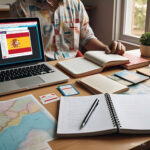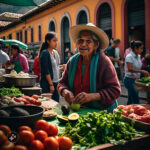Hola a todos, hoy vamos a aprender sobre los sustantivos y sus generos.
El sustantivo es una palabra que identifica: The noun is a word that identifies:
- Una persona: Hermano, profesora, padre. A person: Brother, teacher, father.
- Una cosa: Arepas, parque, bicicletas. A thing: Arepas, park, bicycles.
- Un lugar: Restaurante, biblioteca, casa. A place: restaurant, library, home.
- Nombre propio: Un lugar, una cosa o un evento. Proper noun: A place, a thing, or an event.
Clases de Sustantivos
1. Sustantivo Común: Cualquier persona, animal, cosa, lugar, etc. Common Noun: Any person, animal, thing, place, etc.
- Ciudad, perro, carro, playa, etc. City, dog, car, beach, etc.
2. Sustantivo Propio: Persona, animal, cosa, lugar, etc., específicos. Proper Noun: Specific person, animal, thing, place, etc.
- Lima, Snoopy, Toyota, Regatas, etc. Lima, Snoopy, Toyota, Regattas, etc.
Mas ejemplos:
- La casa. The house
- La luz. The light.
- El angel. The Angel.
- La generosidad. The generosity.
- La tristeza. The sadness.
- La felicidad. The happiness.
- El barco. The boat
- La persona. The person
- La biblioteca. The library
- Martin. Martin
- Bolivia. Bolivia
- Perú. Perú
El Género del Sustantivo
El género de los sustantivos puede ser masculino o femenino. Por lo general es posible cambiar una palabra de género femenino a masculino o viceversa, se cambia la ultima vocal:
The gender of nouns can be masculine or feminine. In general, it is possible to change a word from feminine to masculine gender or vice versa, changing the last vowel:
1. Cambiar la a por la o / la o por la a: Change the a to the o / the o to the a:
- Gata – gato. Cat
- Perro – perra. Dog
2. Otras terminaciones posibles son: Esa, isa, ina, triz. Other possible endings are: Esa, isa, ina, triz.
- Príncipe – princesa. Prince – Princess.
- Poeta – poetisa. Poet – poetess.
- Héroe – heroína. Hero – heroine.
- Actor – actriz. Actor – actress.
Todos los objetos solo tienen UN genero que será importante para memorizar: All objects only have ONE gender which will be important to memorize:
- El lápiz (sólo es masculino). The pencil (only male).
- La mesa (sólo es femenino). The table (only female).
- La víctima (sólo es femenino). The victim (only female).
Hay sustantivos que se usan de forma masculina y femenina: There are nouns that are used masculine and feminine:
- El azúcar, la azúcar. The sugar.
Sustantivos masculinos
1. Palabras terminadas en “o”: Words ending in “o”:
- Chico. Boy.
- Bolígrafo. Ballpoint.
- Cuaderno. Notebook.
2. Personas y animales de género masculino: Male people and animals:
- Toro. Bull.
- Gato. Cat.
- Padre. Dad.
- Hombre. Man.
3. Sustantivos que terminen en “n”, “r”, “s”, “e”, “l”: Nouns ending in “n”, “r”, “s”, “e”, “l”:
- Galón. Gallon.
- Bailador. Dancer.
- Puente. Brigde.
- General. General.
Palabras terminadas en “ma”, “pa”, “ta”. Words ending in “ma”, “pa”, “ta”
- Mapa. Map.
- Clima. Climate.
- Cometa. Kite.
Excepciones: Cima, Dama, Trama. Exceptions: Top, Lady, Plot.
Son masculinos los días de la semana, colores, idiomas, océanos, ríos, montañas y puntos cardinales:
The days of the week, colors, languages, oceans, rivers, mountains and cardinal points are masculine:
- Lunes. Monday.
- Azul. Blue.
- Español. Spanish.
- Sur. South.
Las palabras que terminan en “a” pero son de genero masculino: Words that end in “a” but are masculine:
- El dia. The day.
- El mapa. The map.
- El tema. The topic.
- El problema. The problem.
- El idioma. The language.
- El clima. The weather.
- El fantasma. The ghost.
Sustantivos femeninos
1. Palabras terminadas en “a”: Words ending in “a”:
- Casa. House.
- Taza. Bowl.
- Sala. Living room.
2. Palabras de personas y animales de género femenino: Words of people and animals of feminine gender:
- Vaca. Cow.
- Mujer. Woman.
- Madre. Mother.
- Perra. Dog.
3. Palabras que terminan en “umbre”, “ie”, “ión”, “dad”, “tad”, “is”, “tud”, “encia”. Words that end in “umbre”, “ie”, “ión”, “dad”, “tad”, “is”, “tud”, “encia”.
- Costumbre. Custom.
- Especie. Species.
- Educación. Education.
- Ciudad. City.
- Amistad. Friendship.
- Crisis. Crisis.
- Solicitud. Request.
- Conciencia. Awareness.
Palabras de genero femenino que finalizan en “o”: Feminine gender words that end in “o”:
- La moto. The motorcycle.
- La foto. The photo.
- La mano. The hand.
- La radio. The radio.
Sustantivos con dos géneros: el significado del sustantivo NO cambia. Nouns with two genders: the meaning of the noun does NOT change.
- El azúcar / La azúcar. The sugar.
- El mar / La mar. The sea.
- El calor / La calor. The heat.








